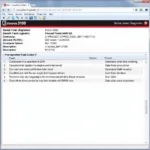A flashing check engine light and a rough-running engine are never a good sign. If you own a Ford vehicle and your OBD2 scanner displays the code P0302, it indicates a problem with cylinder 2 misfires. This article will guide you through the possible causes of a P0302 code in your Ford, common symptoms, and provide comprehensive solutions to get your vehicle back on the road smoothly.
Understanding the P0302 Code
The OBD2 code P0302 specifically refers to a “Cylinder 2 Misfire Detected.” A misfire occurs when the air-fuel mixture in a cylinder fails to ignite properly, disrupting the engine’s combustion cycle. This can lead to reduced engine performance, increased emissions, and potential damage to your catalytic converter if left unaddressed.
Common Causes of P0302 in Ford Vehicles
Several culprits can trigger a P0302 code in Ford vehicles. Identifying the root cause is crucial for effective repair. Here are some of the most common reasons:
- Faulty Spark Plugs or Wires: Worn-out spark plugs or damaged spark plug wires are among the most frequent causes of misfires.
- Fuel Injector Problems: A clogged or malfunctioning fuel injector can disrupt the fuel supply to cylinder 2, causing incomplete combustion.
- Vacuum Leaks: Leaks in the intake manifold or vacuum hoses can disrupt the air-fuel mixture, leading to misfires.
- Ignition Coil Failure: A failing ignition coil will not be able to provide the spark needed for combustion in the cylinder.
- Compression Issues: Low compression in cylinder 2 due to worn piston rings, a damaged valve, or a blown head gasket can also cause misfires.
Symptoms of a P0302 Code
In addition to the illuminated check engine light, a P0302 code may be accompanied by various symptoms, such as:
- Engine Hesitation or Stuttering: You may experience a noticeable lack of power and a jerking sensation when accelerating.
- Rough Idle: The engine may vibrate excessively or run unevenly when the vehicle is stationary.
- Reduced Fuel Economy: A misfiring cylinder can significantly decrease your vehicle’s fuel efficiency.
- Engine Backfires: Loud popping sounds from the exhaust system can indicate unburnt fuel igniting in the exhaust manifold.
Diagnosing and Fixing the P0302 Code
Diagnosing a P0302 code requires a systematic approach:
- Read the Codes: Connect your OBD2 scanner to the vehicle’s diagnostic port and retrieve any stored trouble codes.
- Inspect the Spark Plugs and Wires: Examine the spark plug in cylinder 2 for signs of wear, fouling, or damage. Inspect the corresponding spark plug wire for cracks, burns, or loose connections.
- Check the Fuel Injector: Listen for a clicking sound from the fuel injector when the engine is running. If there’s no sound, the injector may be clogged or faulty.
- Inspect for Vacuum Leaks: Visually inspect the intake manifold and vacuum hoses for any signs of cracks, loose connections, or damage.
- Test the Ignition Coil: Use a multimeter to check the resistance of the ignition coil for cylinder 2. Refer to your vehicle’s repair manual for the correct resistance specifications.
- Perform a Compression Test: A compression test will reveal any significant pressure loss in cylinder 2, which may indicate mechanical issues with the engine.
Repair Options for a P0302 Code
Once you’ve identified the root cause of the P0302 code, you can proceed with the necessary repairs. Here are the common solutions:
- Replace Spark Plugs and Wires: If you find worn-out spark plugs or damaged wires, replace them with new ones that meet the manufacturer’s specifications.
- Clean or Replace Fuel Injectors: Clogged fuel injectors can often be cleaned using a fuel injector cleaning kit. However, severely clogged or faulty injectors may require replacement.
- Repair Vacuum Leaks: Seal any leaks in the intake manifold, vacuum hoses, or related components using appropriate sealant or by replacing damaged parts.
- Replace Ignition Coil: If the ignition coil for cylinder 2 is faulty, replace it with a new one.
- Address Compression Issues: Low compression issues often require more extensive repairs, such as replacing piston rings, valves, or even a head gasket.
“Regular maintenance is key to preventing engine misfires,” says John Smith, Senior Automotive Technician at XYZ Auto Repair. “Timely spark plug replacement and addressing minor issues before they escalate can save you from costly repairs down the road.”
Conclusion
Addressing a P0302 code promptly is crucial for maintaining your Ford’s performance, fuel efficiency, and overall health. By understanding the causes, recognizing the symptoms, and following the diagnostic and repair steps outlined in this article, you can effectively resolve the issue and restore your Ford’s smooth operation. Remember, if you’re uncomfortable performing these repairs yourself, it’s always best to consult a qualified mechanic.
FAQs
Q: Can I still drive my Ford with a P0302 code?
A: While you might be able to drive short distances, it’s highly discouraged. Driving with a misfiring cylinder can damage your catalytic converter and lead to more extensive repairs.
Q: How much does it cost to fix a P0302 code?
A: The repair cost can vary depending on the underlying cause. Replacing spark plugs is relatively inexpensive, while addressing compression issues can be significantly more costly.
Q: Can bad gas cause a P0302 code?
A: While uncommon, contaminated fuel can potentially contribute to misfires. Adding a fuel system cleaner to your gas tank might help resolve the issue if it’s related to fuel quality.
Q: How often should I replace my Ford’s spark plugs?
A: Refer to your owner’s manual for specific recommendations. Generally, spark plugs should be replaced every 30,000 to 100,000 miles, depending on the type of spark plugs and driving conditions.
Need More Help?
If you need further assistance diagnosing or fixing a P0302 code in your Ford, feel free to check out our other helpful resources:
For personalized support, don’t hesitate to reach out to our team of automotive experts. Contact us via WhatsApp at +1(641)206-8880 or email us at [email protected]. We’re available 24/7 to assist you with all your car diagnostic needs.
